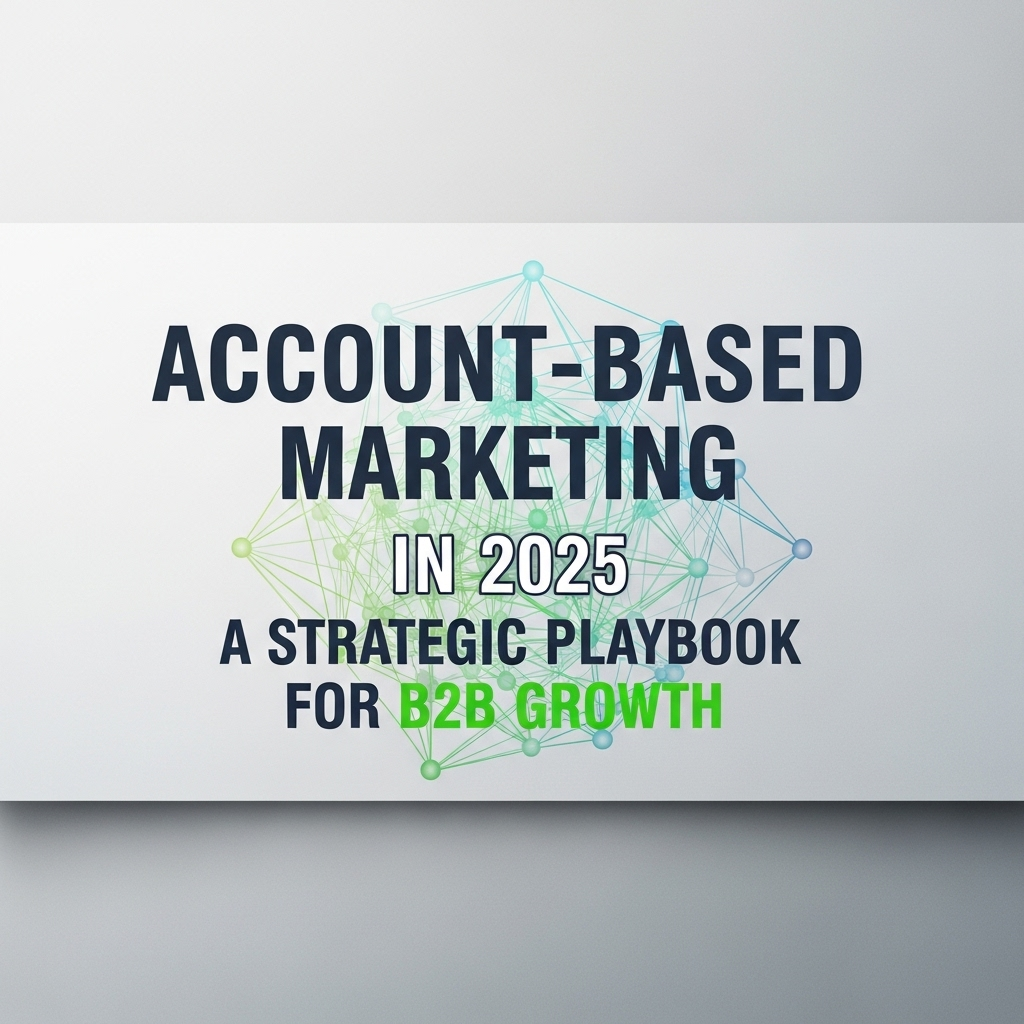Account-Based Marketing in 2025: A Strategic Playbook for B2B Growth

Introduction
B2B marketing has entered a new era in 2025—one where personalization, precision, and predictive intelligence drive revenue growth. Account-Based Marketing (ABM) is no longer just a niche strategy; it has become a mainstream, boardroom-level priority for CMOs and demand generation leaders.
Why? Because ABM directly aligns sales and marketing efforts around high-value accounts, ensuring every campaign is purposeful, measurable, and revenue-focused. With AI, intent data, and advanced MarTech stacks, ABM is now smarter and more scalable than ever before.
In this playbook, we’ll explore what ABM really means in 2025, the challenges it solves, proven strategies to implement it, and future trends shaping its role in B2B growth.
What is Account-Based Marketing and Why It Matters
At its core, ABM flips the traditional marketing funnel. Instead of casting a wide net to capture leads, ABM identifies and engages specific high-value accounts most likely to generate ROI.
- Definition: A strategic approach where marketing and sales collaborate to engage, nurture, and convert target accounts through personalized campaigns.
- Relevance in 2025: With buyer committees growing larger and purchase decisions becoming more complex, ABM ensures that brands are seen as trusted advisors rather than just vendors.
📊 Stat Insight: According to Forrester, 71% of B2B organizations using ABM in 2025 report stronger pipeline growth compared to traditional lead-gen models.
Challenges in ABM for Martech Leaders
While ABM delivers exceptional results, leaders face specific roadblocks:
- Data Silos & Fragmentation – Customer data spread across multiple CRMs, CDPs, and marketing automation platforms limits visibility.
- Scaling Personalization – Crafting hyper-relevant content for each decision-maker across hundreds of accounts remains resource-heavy.
- Sales-Marketing Misalignment – Without shared KPIs and collaborative workflows, ABM programs often stall.
- Measuring ROI Accurately – Attribution challenges make it difficult to tie marketing activity to closed-won deals.
💡 Real-world example: A SaaS enterprise with 500 target accounts struggled with fragmented engagement tracking. After unifying intent signals across their CDP, they improved account penetration by 38%.
Proven Strategies to Leverage ABM
To maximize ABM success in 2025, leaders must adopt a structured, data-first approach:
1. Align Sales and Marketing Teams
- Co-create Ideal Customer Profiles (ICPs) and account lists.
- Set joint revenue-based KPIs.
- Conduct regular alignment workshops.
2. Use AI and Intent Data for Account Prioritization
- Deploy AI-driven account scoring to focus on accounts with active buying signals.
- Leverage tools like Demandbase, 6sense, or ZoomInfo for predictive engagement.
3. Build Multi-Channel Engagement
- Personalize outreach via LinkedIn, webinars, and targeted ads.
- Use dynamic website personalization for account visitors.
- Leverage 1:1 email sequences tailored to decision-maker roles.
4. Create Hyper-Personalized Content
- Develop account-specific playbooks and ROI calculators.
- Deliver industry-tailored case studies to influence buying committees.
5. Measure and Optimize ABM Performance
- Track metrics such as:
- Account engagement score
- Pipeline velocity
- Deal size growth
- Use closed-loop attribution models to prove revenue impact.
Trends and the Future of ABM in 2025
ABM is rapidly evolving with technology and buyer expectations:
- AI-Powered ABM: Predictive insights help identify the right accounts before competitors do.
- Agentic ABM Platforms: AI agents automate outreach, follow-ups, and engagement monitoring.
- GTM Convergence: ABM integrates tightly with demand generation, product-led growth, and partner marketing.
- Privacy-First ABM: With stricter data regulations, anonymized intent data and consent-driven targeting will dominate.
Pro Tips & Bonus Insights
- Pilot before scaling – Start with 50–100 accounts, refine playbooks, then scale.
- Invest in ABM technology – Tools like HubSpot ABM, Terminus, and RollWorks streamline orchestration.
- Adopt a tiered ABM model – Differentiate strategies for Tier 1 (1:1), Tier 2 (1:few), and Tier 3 (1:many) accounts.
Conclusion
ABM in 2025 is not just a marketing tactic—it’s a growth engine that drives meaningful engagement with the right accounts at the right time. By aligning sales and marketing, leveraging AI and intent data, and delivering hyper-personalized campaigns, B2B leaders can achieve predictable revenue growth and stronger customer relationships.
👉 Ready to elevate your ABM strategy? Connect with us to explore how we help B2B brands execute winning ABM programs.
- Art
- Causes
- Crafts
- Dance
- Drinks
- Film
- Fitness
- Food
- Oyunlar
- Gardening
- Health
- Home
- Literature
- Music
- Networking
- Other
- Party
- Religion
- Shopping
- Sports
- Theater
- Wellness


